We May Just Be Living in Our Very Own “Squid Game”
Photo Taken From The Guardian/Pavlo Gonchar
“Squid Game” is the first Netflix show to surpass 100 million viewers within the first month. For the last several years, Netflix has focused more on international growth, having invested greatly into shows and films with foreign languages.
Note: This article contains mature content and spoilers of the first season of Squid Game.
Following a period of slow subscriber growth, the dystopian drama “Squid Game” rose to the top recently as Netflix’s biggest series launch yet. The hit show reflects numerous issues that haunt modern society.
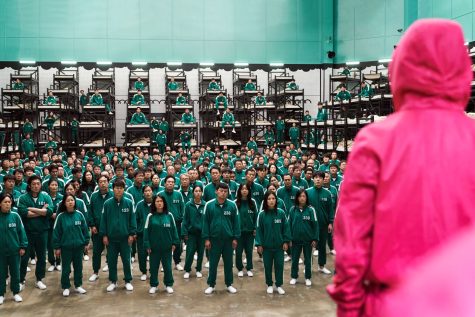
The story centers around 456 individuals in South Korea in such extreme debt that they desperately enter a competition to win the tremendous amount of money offered. But of course, there’s a catch: the players are pitted against each other as they compete in a series of children’s games where they are brutally killed if they lose.
Each of the players is in so much debt in the real world that their lives are miserable, almost unlivable. To them, they practically have no choice but to give in to their temptation and enter the game. While the players are consumed in their desperation to win, however, the wealthy behind it all watch the contest as entertainment.
A survival drama where the low and middle class are pitted against each other over money is not something far out of reach of our current society. In fact, we are living in our very own survival drama ourselves, through a capitalist society.
The whole concept of pitting the low and middle class against each other as entertainment for the rich isn’t a new concept for entertainment media to touch on. What’s unique is Squid Game’s approach: instead of the story being presented as a dystopia of the future, it’s displayed as a dystopian reality of modern times.
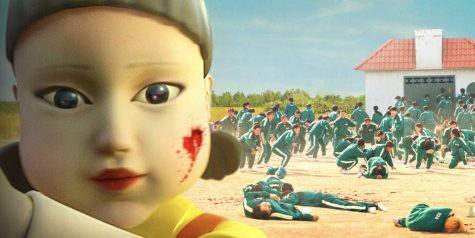
With each game being a simple children’s game, the show’s angle focuses more on the characters and themes, touching on numerous societal issues that are all connected to money.
Main character Seong Gi-hun’s hard times began when he lost his job and then endured violence in a protest where workers were striking. Anti-labor reactions aren’t super uncommon in South Korea, as only 10% of workers are in labor unions, and some laws limit unions from negotiating pay.
Just like Korea and many other countries, the U.S. has an active anti-labor fight, as the “Right to Work” laws are misleading; instead of the workers benefitting, Right to Work laws increase the power of corporations and make it hard for unions to operate.
Thousands of South Korean workers had a general strike on October 20, actually wearing the Squid Game guard uniforms to symbolize the awful economic conditions in the country. South Korea faces the third highest amount of annual working hours and 40% of workers are ‘irregular workers,’ where they don’t get the same benefits as a fully employed person and their employment is precarious.
The group, members of the Korean Confederation of Trade Unions (KCTU), is calling for an end to irregular employment contracts and laws that don’t protect small company employees from discrimination, along with various other demands. The KCTU also aims for the Korean government to take more responsibility for ensuring job security and the rights of all workers to form unions.

“We continue to move forward to a world of equality with the cries of workers who filled the streets and resounded across the country,” the group said, adding that the protest is the first step necessary for inequality in the world to be overcome.
Back in Squid Game, Gi-Hun’s situation is characterized by extreme financial distress that leads him to sign his rights away and eventually participate in the mystery competition: a series of six children’s games. The first game is ‘Red Light Green Light,’ where players try to move towards the finish line when they hear “green light.” They quickly learn that they will be violently shot and killed if they are caught moving during “red light,” causing sudden horror and panic amongst the players.
After a horrifying massacre, many of the remaining players that completed the game decide to end the games, and this is possible under Clause Three: ‘If the majority of players agree to abandon the game, the game ends.’
The players then vote if they want the games to continue or not, and it’s a very close call. In the end, the game does end and the players are sent back to their communities.
That should be a good thing, right? Not exactly. Many players discover that their normal, debt-consumed lives are no better than the games. Gi-Hun realizes that his elderly mother desperately needs medical attention and feels powerless so he rejoins the game, along with other characters. This time, the competition is more fierce because of everyone’s amplified motivations to rid their debt and finally change their lives.
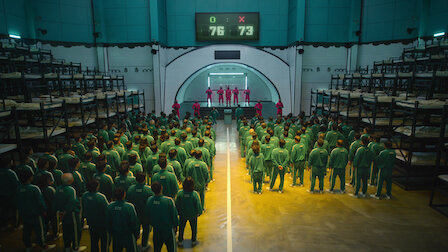
It’s survival of the fittest, with a facade of so-called “equality.” The Front Man, the man running the games, expresses the importance that all players have an equal chance of winning the games. Everyone must play by the rules, and he goes to what seems like extreme lengths to prove this.
When a Squid Game worker gets caught giving a player inside information, the Front Man shoots and kills him on the basis that the worker’s actions were jeopardizing their mantra of equality, as the game’s fairness is making up for the player’s lack of equality in the real world.
“Here, the players get to play a fair game under the same conditions,” the Front Man said. “Those people suffered from inequality and discrimination out in the world, and we’re giving them the last chance to fight fair and win.”
In actuality, the workers are seen to be expendable, just like how the players are. While the players are pitted against one another in violent competitions, the workers are exploited and tossed aside if deemed necessary.
Individuality is also taken away from both the players and the workers, as nobody gets referred to by their name but instead an assigned player or worker number, along with worker ranks.

The true objective of the games is revealed in episode 7: “VIPS.” International billionaires visit the Squid Game location and watch the games as luxurious entertainment, placing bets on players they think will succeed. When the players play a game about crossing a bridge of glass panels, one player reveals he has much knowledge on making glass. He uses this skill to determine which glass panels are safe to cross, but when the Front Man and VIPs notice, they turn off the lights to prevent him from utilizing his ability. In the end, the Front Man caters to the entertainment of his VIPs instead of upholding true equality within the games.
Another overarching purpose of the game is unveiled in the last episode, “One Lucky Day.” Player 001, an elderly man with a brain tumor and Gi-hun’s newfound friend from the games, is actually the mastermind behind everything. The man, named Oh Il-nam, explains that the games were made because the rich and poor are apparently much alike.
“Do you know what someone with no money has in common with someone with too much money to know what to do with? Living is no fun for either of them.” Il-nam revealed this to Gi-hun after inviting him over to explain everything. “If you have too much money then it doesn’t matter what you eat, or drink, or whatever. Everything, well, it all gets boring. […] What could we all do to have some fun?”
It’s the ultimate plot twist of the show, where the true objective of Il-nam, who the audience grew to love and pity, is uncovered. The rich are so wealthy that they are bored, and the poor are miserable in their own lives. The games were simply made for the amusement of the rich and a cruel opportunity for the poor.
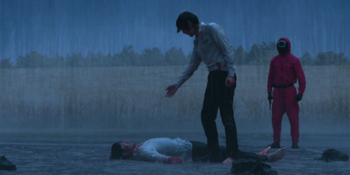
Il-nam is echoing how tone-deaf the rich are in society. In the last game when there are only two final players left, one is close to killing the other when he backs away and begs that they use Clause Three and vote to end the games. After days of trauma from seeing people die, Gi-hun can’t handle killing his childhood friend.
The VIPs on the other end can’t fathom why a player would turn down winning all that money after coming so close. They are instead disappointed and infuriated.
Squid Game is the first television show by longtime filmmaker Hwang Dong-hyuk who is known for other successful drama films such as “The Fortress” and “Silenced.” His entire purpose for this show was to portray the issue with our capitalist society through realistic characters.
“I wanted to write a story that was an allegory or fable about modern capitalist society, something that depicts an extreme competition, somewhat like the extreme competition of life. But I wanted it to use the kind of characters we’ve all met in real life,” Hwang said.
“As a survival game, it is entertainment and human drama. The games portrayed are extremely simple and easy to understand. That allows viewers to focus on the characters, rather than being distracted by trying to interpret the rules.”
Not only does Squid Game convey themes that can be extended to capitalist society and power structures worldwide, but there are also themes that reflect South Korea’s current reality and the country’s complicated history. If you haven’t seen Squid Game, there are so many more details to catch so I highly suggest watching it—just try to forget the spoilers in this article… and don’t pick a favorite character.


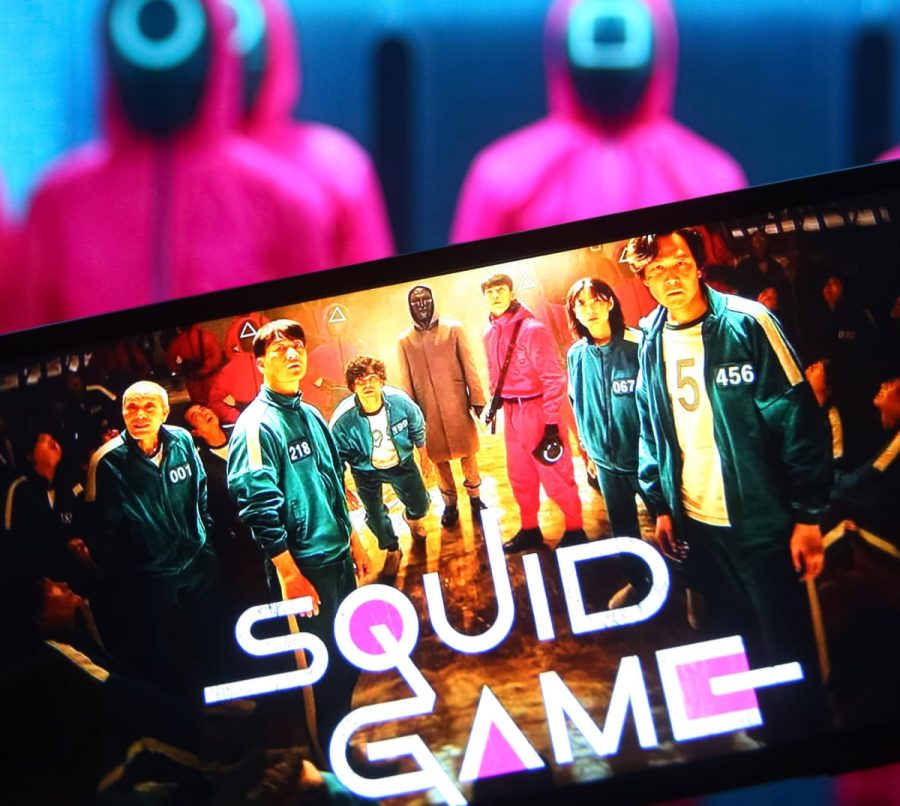
L ◊ Nov 6, 2021 at 4:41 pm
Very valid points!